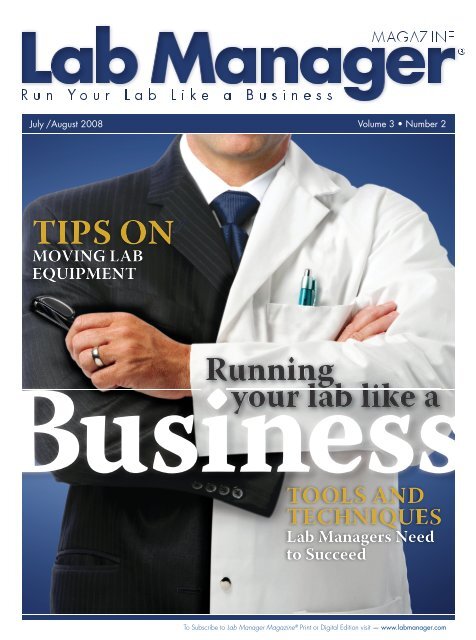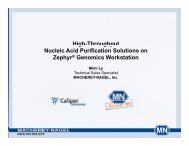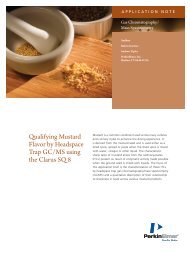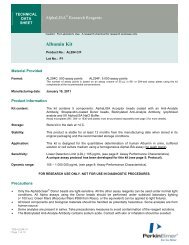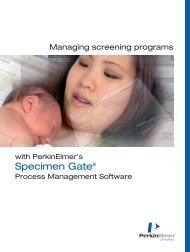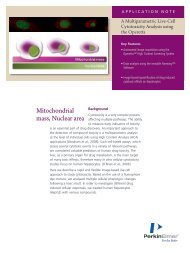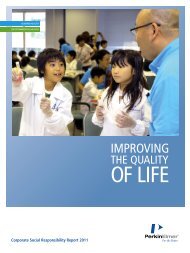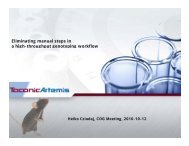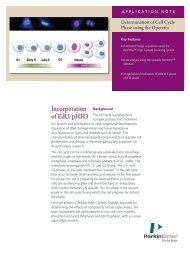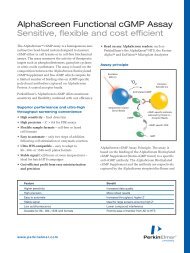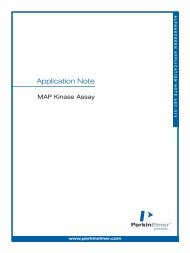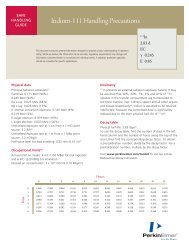PerkinElmer OneSource - Moving Lab Equipment
PerkinElmer OneSource - Moving Lab Equipment
PerkinElmer OneSource - Moving Lab Equipment
Create successful ePaper yourself
Turn your PDF publications into a flip-book with our unique Google optimized e-Paper software.
July /August 2008<br />
Volume 3 • Number 2<br />
TIPS ON<br />
MOVING LAB<br />
EQUIPMENT<br />
Business<br />
TOOLS AND<br />
TOOLS AND<br />
TECHNIQUES<br />
<strong>Lab</strong> Managers Need<br />
to Succeed<br />
To Subscribe to <strong>Lab</strong> Manager Magazine ® Print or Digital Edition visit — www.labmanager.com
BUSINESS & FINANCE<br />
MOVING LABORATORY<br />
EQUIPMENT<br />
LABORATORY RELOCATION REQUIRES EXPERTISE IN MANAGING THE COMPLEXITIES ASSOCIATED<br />
WITH MOVING SCIENTIFIC INSTRUMENTS AND SAMPLES. THIS ARTICLE DISCUSSES SOME KEY<br />
CONSIDERATIONS IN EVALUATING POTENTIAL RELOCATION PROVIDERS.<br />
As pharmaceutical and other sciencefocused<br />
organizations restructure in this<br />
era of consolidation and outsourcing,<br />
the need to move research and testing<br />
equipment, samples, and even complete<br />
laboratories to new locations is an increasing trend as<br />
companies look to optimize utilization of their capital<br />
investment or shift production to geographies with<br />
lower costs of doing business. <strong>Lab</strong>oratories, regardless of<br />
size or field, can minimize the financial, scientific, and<br />
regulatory compliance risks associated with relocation if<br />
they make the right moves along the way.<br />
One of the most important steps a laboratory can take is<br />
finding an experienced instrument and scientific sample<br />
relocation specialist. The use of a specialized relocation<br />
service provider can do much to streamline the<br />
transition process, ensure the safety of instruments and<br />
samples, maintain a laboratory’s compliance standing<br />
(where necessary), and provide the lab manager with<br />
real-time visibility throughout the process.<br />
Relocation requires deliberate, careful, and documented<br />
steps and entails many facets, all of which must be<br />
addressed in a manner that ensures maximum uptime<br />
at both ends of the process. Instrumentation needs to<br />
be inventoried and decisions made about what to move<br />
versus what to retire and how to best deploy instrumentation<br />
at another facility. Protocols must be followed for<br />
decommissioning and recommissioning. Significant care<br />
must be taken in preparation and transport of scientific<br />
instruments and valuable samples.<br />
<strong>Moving</strong> across international borders introduces additional<br />
complexity, including customs regulations and<br />
specialized shipping documentation. Challenges are<br />
ramped up another notch in heavily regulated industries<br />
that necessitate compliance with Good <strong>Lab</strong>oratory Practices<br />
(GLP) and Good Manufacturing Practices (GMP).<br />
Since a typical laboratory relocation can take four to<br />
six months of planning, such a project is best handled<br />
by outsourcing to laboratory service providers whose<br />
specialized expertise in scientific asset relocation can<br />
minimize the impact of moving on the laboratory’s<br />
scientific mission and productivity.<br />
Relocation specialists often assume end-to-end responsibility<br />
for all aspects of the move, working closely with a<br />
laboratory’s internal resources and external providers. In<br />
this scenario, laboratory personnel can focus on research<br />
and testing while their relocation partner’s experts manage<br />
the many business and logistical needs specific to<br />
the move. No matter what the laboratory’s size or scope,<br />
deploying a laboratory relocation specialist can ease the<br />
burden and logistical challenges and minimize disruption<br />
to the laboratory’s primary mission.<br />
2 <strong>Lab</strong> Manager labmanager.com
BUSINESS & FINANCE<br />
Project Tracking and Scheduling<br />
Deliberate, proven processes are key in any lab relocation, starting<br />
with research as fundamental as identifying in-house assets<br />
destined to be relocated. Corralling the multitude of details —<br />
including instruments, contacts, and samples as well as meetings<br />
and timelines — should be streamlined with the use of expert<br />
project management software.<br />
Management software ensures accountability for both processes<br />
and timelines by tracking key events and maintaining inventory<br />
control. Items to include:<br />
• Instrument inventory<br />
• Regular strategy meetings<br />
• <strong>Lab</strong>eling/tagging equipment<br />
• GLP/GMP document creation<br />
• <strong>Equipment</strong> relocation timelines (with move and install dates)<br />
• Chemical move provisions<br />
• Sample handling and transport<br />
• Post-calibration<br />
• Repair<br />
• Qualification<br />
• Large equipment moves<br />
A relocation consultancy should explain the tools they employ<br />
to effi ciently manage and schedule a relocation project as well as<br />
the processes employed that will verify accuracy when completing<br />
tasks such as a comprehensive inventory audit and asset labeling.<br />
The relocation partner should also ensure that the project<br />
management process can accommodate the inevitable changes<br />
to tasks, relocation needs, and timing. The timeline and process<br />
should proactively address potential hurdles, such as the special<br />
needs of moving oversized equipment, and provide the lab manager<br />
with maximum visibility throughout the engagement.<br />
Once in the new location, project tracking should continue<br />
through reinstallation of all laboratory instruments and holistic<br />
testing prior to performing any qualifications or validations<br />
required post-move.<br />
Collaboration and Teamwork<br />
As with any large and complex project, collaboration between<br />
your relocation partner and your internal team is a critical success<br />
factor.<br />
An effective model is to establish a corporate team including a<br />
project manager and representatives from facilities, engineering,<br />
quality assurance and compliance, along with scientists and the<br />
construction manager. The service provider should designate<br />
their on-site project manager, scientists supporting the project,<br />
customer service engineers, and support staff.<br />
Your service provider should then structure lines of communication<br />
and timelines including the client and any subcontractors<br />
handling the physical move, chemical waste management, and<br />
other specialized logistical support.<br />
Joint meetings are crucial to the success of any relocation<br />
project; and your relocation partner should ensure these forums<br />
occur on a regular basis. Success often requires that teams need<br />
to meet weekly or biweekly, particularly in the latter stages of<br />
relocation engagement, in order to avoid miscommunication and<br />
maximize effi ciency.<br />
Multi-vendor Qualification and Validation<br />
Knowledge of regulatory compliance is crucial in any move involving<br />
regulated laboratories. Whether an instrument is moved<br />
down the hall or across the country, its regulatory status must be<br />
<strong>Lab</strong> Manager<br />
3
BUSINESS & FINANCE<br />
safeguarded. As your partner, your relocation specialist should<br />
demonstrate knowledge of compliance requirements and have<br />
the technical expertise and resources to handle analytical instrument<br />
validation/qualification across a range of technologies and<br />
manufacturers.<br />
For laboratories in heavily regulated environments, a relocation<br />
service provider’s demonstrated regulatory compliance experience<br />
and expertise should be critical selection criteria. Selecting<br />
a firm with proven multi-vendor compliance capabilities<br />
can provide essential insights regarding overarching regulatory<br />
compliance issues and implications associated with laboratory<br />
relocation, and help protect the lab from undue risk during the<br />
move process.<br />
Significant financial and operational effi ciencies are gained when<br />
the relocation service provider can also perform qualifications/<br />
validations on a variety of instruments from various manufacturers<br />
while maintaining the integrity of the document audit trail<br />
during the entire relocation process — an approach that ensures<br />
maintaining GXP status. Cross-manufacturer expertise also enables<br />
the service provider to manage all equipment manufacturer<br />
protocols and create consistent reporting templates to harmonize<br />
documentation while streamlining control, the auditing<br />
of each instrument, and review of instrument-specific histories<br />
throughout the relocation process. In some instances, the service<br />
provider can even develop custom qualification protocols.<br />
Whether it is regulatory knowledge, scientific instrument expertise,<br />
or operational effi ciency, depth of knowledge comes into<br />
play most critically when the unexpected happens. That’s when<br />
the utilization of a specialized laboratory relocation provider<br />
with experience in mitigating the myriad of issues that can arise<br />
during the relocation process proves itself as one of the smartest<br />
investments today’s well-informed lab manager can make.<br />
Summary<br />
<strong>Moving</strong> analytical instrumentation is an innately complex process<br />
that requires careful planning and execution to ensure that<br />
scientific instrumentation, laboratory equipment, and precious<br />
samples arrive at their destination safely, and that the new laboratory<br />
meets all compliance requirements and is able to become<br />
productive as quickly as possible.<br />
With management of the entire relocation process by a specialized<br />
laboratory relocation partner with dual expertise in scientific<br />
asset relocation and multi-vendor instrument services, both<br />
scientists and laboratory managers can focus on scientific and<br />
business goals with minimal risk and downtime.<br />
Joseph Tehrani, Ph.D., is Global Business Leader of Multivendor<br />
Validation & <strong>Lab</strong>oratory Relocation; Kevin Ajoku is Senior<br />
Manager of Territory Marketing & Business Development; and<br />
Ralph Dioguardi is Business Manager for <strong>Lab</strong>oratory Relocation<br />
for <strong>PerkinElmer</strong>’s <strong>OneSource</strong> <strong>Lab</strong>oratory Services, which<br />
includes laboratory relocation. www.perkinelmer.com/onesource.<br />
Corporate Headquarters<br />
940 Winter Street<br />
Waltham, Massachusetts 02451, USA<br />
Customer Care: +1-800-762-4000 (USA)<br />
Corporate Inquiries: +1-781-663-6900<br />
4 <strong>Lab</strong> Manager labmanager.com


